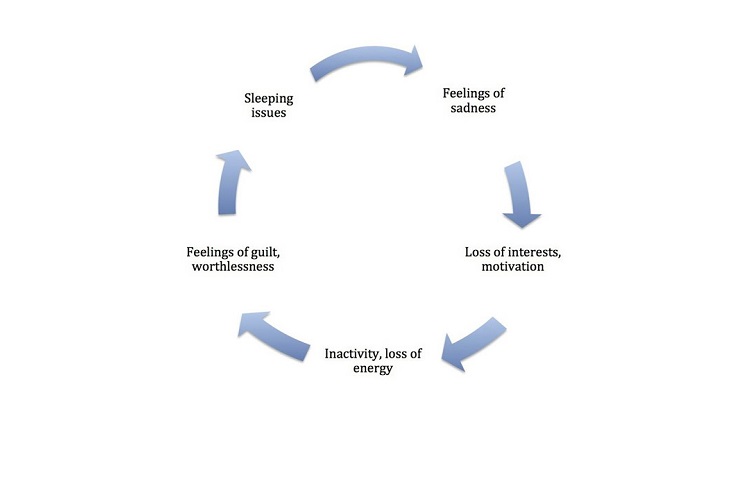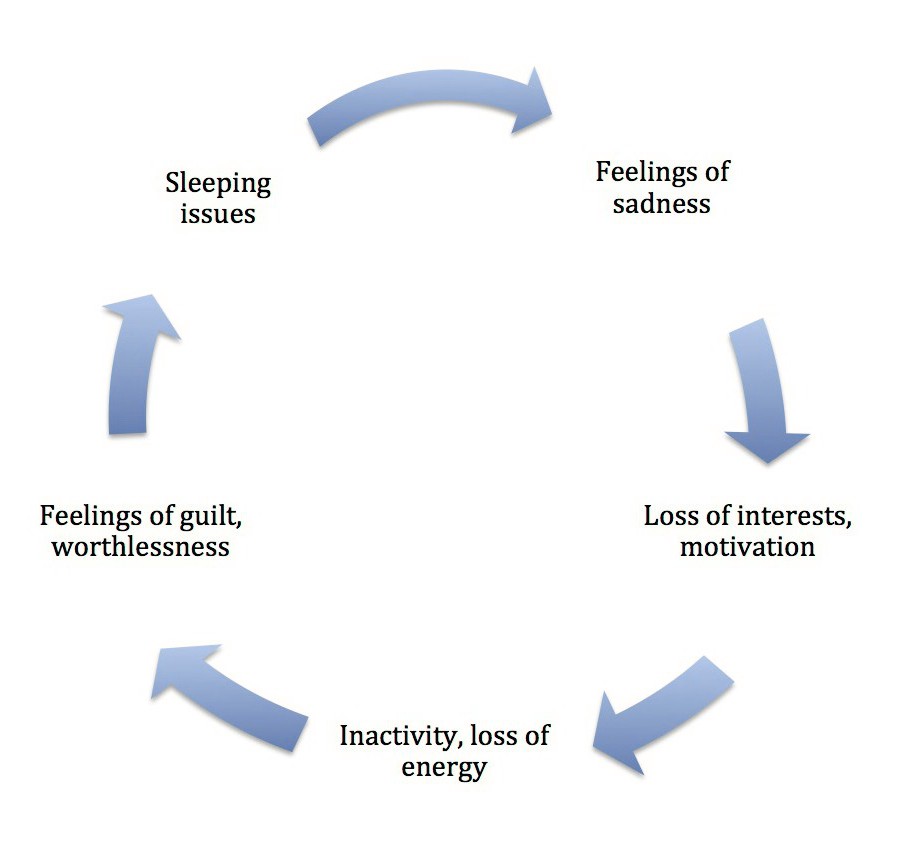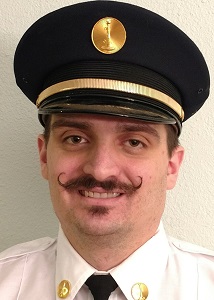

Figure found on Wikimedia Commons courtesy of U3121176.
By Nathan Fuist
My name is Nathan Fuist. First and foremost, I am a father, a husband, a family member, and friend to many. I started with the Shrewsbury (MO) Fire Department (SFD) in St. Louis County in 2010, and I have been its medical officer since 2012. Prior to that, I worked in emergency medical services (EMS) for four years, and then as a volunteer firefighter. I work with an amazing group of firefighters who I trust with my life. I currently work on promoting diversity in the fire service and through Local 2665 as the secretary/recorder for its human resources committee. I am also a part of its PEER Support program, which strives to provide mental health support for our firefighters. I volunteer with the St. Louis County Critical Incident Stress Debrief and the Firefighter Funeral Assistance teams. With my friends’ help, I have conducted research and developed a class designed specifically for first responder mental health and suicide awareness.
Since becoming a firefighter, I’ve wanted to do more for other firefighters after noticing a troubling trend: mental health and suicide awareness education was lacking. St. Louis County has had a surprising number of suicides in the past 10 years; most recently, we had two in a one-month span. I found that firefighter suicides outnumber line-of-duty deaths, and are only the ones voluntarily submitted to the FFBHA.org. This is based off numbers I have obtained through organizations such as the Firefighter Behavioral Health Alliance and through other fire service articles. Suicides are on the rise; this impacts not only the person in need but also their friends, family, and coworkers.
So, you may ask, “Why is this what I have chosen to focus on?”
When I was 15 years old, my family suffered a tragedy. On November 15, 1999, we received a knock on the door and, when I answered, I immediately thought I was in trouble. I hung my head as I told my mom the police were here. As she went outside to talk to them, a friend and I watched from the other room. That is when I saw my mom throw her face into her hands. For some reason, I knew exactly what that meant—my dad was not coming home. My mom came running in toward me and all I asked was what happened. That is when she said something I would never forget, “Your dad shot himself and he is dead.”
It was on that day that, through this tragedy, I found a mission in life. I would not be ashamed of how he died, but rather I would teach others that suicide comes from depression, and that depression is a treatable illness.
As an awkward preteen and young adult, my dad had been there while I struggled with my own depression and anxiety. Prior to going to school, he helped me tremendously every morning to muster up the courage to go. He would explain to me that there was so much more to life than school and that everything that I was experiencing was only temporary. Yet, he never told me about his own depression or how he dealt with it which, in a way, makes sense. Why would a father tell his depressed son that the things he said to help his son he may not believe himself? The problem was that he only told my mom that he was seeing a psychiatrist after suffering a traumatic brain injury in 1996.
RELATED: Dill on Mental Health Crisis: Have You Preplanned? ‖ Lamplugh: I’m a Firefighter with PTSD…Now What? ‖ Castleman on Firefighter Behavioral Health: First Aid for Us
I wish I could say that I went to therapy afterward and that things started to get better. But unfortunately, at this point, that is not true. Shortly after his death, my mom was diagnosed with breast cancer. She fought a long and hard battle with the disease but, after three years, she died peacefully with her family by her side. At 19, after caring for my mom for quite some time, I needed to figure out how to live my life on my own. Had I not received help from my sister, I don’t know how far I would have gotten. She continues to be a monumental figure in my life, and we are closer than we have ever been. After some soul searching, I came to the conclusion that becoming a firefighter would be my way of helping others. Public service is in our family. Many close relatives are or have been in the military, the health care field, and the police force.
Prior to being able to help others, I still needed to help myself. My sister played a huge role in helping me; she helped find me a therapist that fit my needs, and she reminded me to make an appointment with my doctor about the possibility of needing medications for anxiety and depression. Things started to come together, and I was able to start down the path to becoming a firefighter.
After beginning my first career fire position with the SFD, it did not take much time for me to try and find other ways I could help people in our profession. This is the time when I went to instructor classes to develop my own course. I also had privilege of meeting Jeff Dill when he came in for his class “Saving Those Who Save Others.” He then introduced me to Dan DeGryse of the Rosecrance Florian program. DeGryse has worked with firefighters’ addiction and mental health for years while also ensuring their anonymity. For DeGryse, keeping them in comfortable surroundings was of the utmost importance. These two men have been paramount in helping me with my class and many other aspects of my health and career.
Word started spreading that I was working on ridding the stigma surrounding mental health and suicide. People were referred to me for my knowledge on mental health and the references to help them. Since then, Local 2665 allowed me to share my testimony of being a survivor of my dad’s suicide to attending members at three of their monthly membership meetings. “Nervous” is not a strong enough word to explain how I felt about going up in front of about 200 members. However, after each speech, I received a standing ovation, and many members approached me to hug me and share their experiences of their own mental illnesses. Some even wished that education on mental health had existed at the beginning of their own careers.
Things began to look up. I was given the opportunity to teach at the fire academy, which was well received by the students. Just as the man who approached me after the testimony who has wished he had the education on mental health during his career, these new recruits now have resources that they can use as they start their journeys.
Unfortunately, this is when things started to take a turn.
I felt great helping other people, but something else started to weigh on me. Not being able to properly grieve my own parents’ deaths, my anxiety, depression, and the countless calls that we I was running started to add up. In 2016, I started noticing something about myself. I wasn’t as happy about life. I was newly married, and although that was amazing and I love my wife deeply, my mind was in a fog. I was unable to recognize what I was experiencing. I slowly felt that I didn’t want to leave the house. Going out with friends seemed less important. At work, I talked less to my coworkers, and instead of being in the TV room, I went elsewhere. I was getting more agitated at home and at work. I know that by reading this, it may seem obvious what had been going on. But for the people who are experiencing the symptoms at the time, it may not appear unusual to them. My anxiety had been increasing, and yet, it was decreasing my attitude toward life.
Please stay tuned for Part 2, which will be posted next Friday, March 10.
 Nathan Fuist is a firefighter/paramedic and the medical officer for the Shrewsbury (MO) Fire Department in St. Louis County. He became an advocate on lifting the stigma on suicide and mental health after he lost father to suicide.
Nathan Fuist is a firefighter/paramedic and the medical officer for the Shrewsbury (MO) Fire Department in St. Louis County. He became an advocate on lifting the stigma on suicide and mental health after he lost father to suicide.

